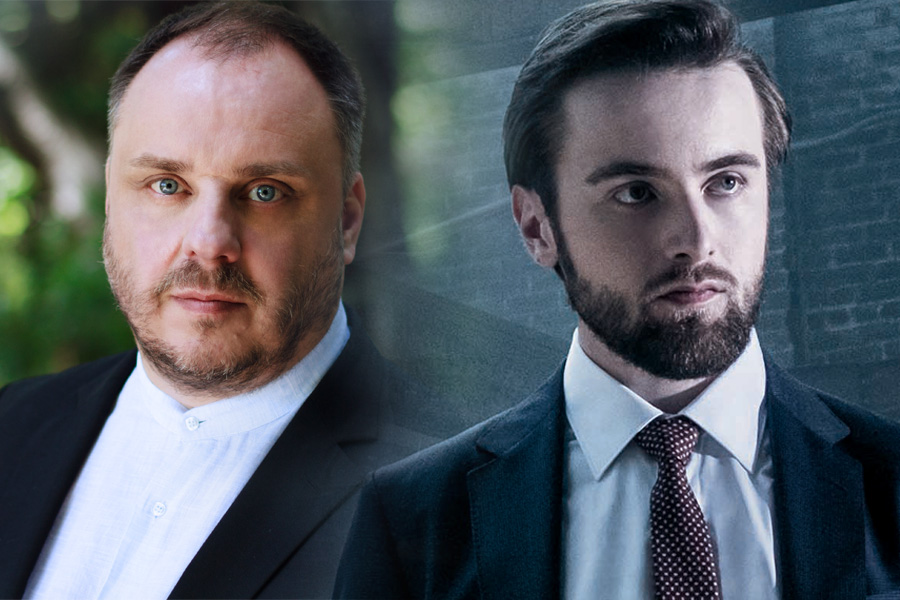Death becomes Goerne, Trifonov and friends with lieder in new black clothes

Matthias Goerne performed lieder with Daniil Trifonov and members of the New York Philharmonic Sunday at 92Y.
If you like your lieder on the somber side, the place to be Sunday afternoon was the 92nd Street Y, where baritone Matthias Goerne—assisted by pianist Daniil Trifonov and principal string players from the New York Philharmonic—spent most of his allotted time longing for death, regretting death, protesting death, or welcoming death.
Even Johannes Brahms wrote only four “serious songs” to make his Op. 121. Hanns Eisler wrote eight Ernste Gesänge, just before his death in 1962. Goerne—who has made the Brahms opus his calling card, singing it four times in New York recitals, most recently with Trifonov—turned to Eisler’s set on Sunday, and surrounded it with musings by Schubert, Schumann, and Brahms that were as dark or more so.
Deepening the shadows of this recital was a murmur of strings in place of the customary piano, either because the song was composed that way or by arrangement of the original piano part. There’s a world of difference between the thousand little percussions of a piano, however gently played, and the gliding attacks and swells of violins, violas and cellos.
It was a trifle odd to know that one of the most admired pianists in the world was parked offstage while the baritone and his string-playing colleagues performed some of the classics of the voice-and-piano literature.
That said, there was no faulting the care and sensitivity brought to the initial group of Schubert songs, as arranged by the French cellist and conductor Raphaël Merlin. The players were violinist Frank Huang, violist Cynthia Phelps, cellist Carter Brey, and double bassist Timothy Cobb—all Philharmonic principals—and the orchestra’s assistant concertmaster, violinist Michelle Kim.
For his part, Goerne wielded his big, resonant voice mostly at about one-third power through “Die Götter Greichenlands,” “Der Tod und das Mädchen,” “Der Jüngling und der Tod,” “Atys,” and “Der liebliche Stern,” bobbing at the knees and conducting a bit to urge on his colleagues (or himself, one couldn’t exactly tell).
It was, at the very least, a relief to hear a singer scale his vocal production to the smallish space that is Kaufman Concert Hall. Matching his sound to the strings may have come at the expense of some clarity of diction, and low lighting in the house made following the printed text difficult, but Goerne’s phrasing seemed well attuned to the songs’ nuances of mood and imagery.
Eisler’s Serious Songs—originally for baritone and string orchestra, performed Sunday by the above players plus their Philharmonic colleagues Cong Wu (assistant principal violist) and cellist Nathan Vickery—proved quite affecting despite the composer’s insistence on an unsentimental, Brechtian approach to his scores.
This pupil of Schoenberg was also a committed socialist, and in setting texts by 19th– and 20th-century poets that hinted at hard-won truths, he could smooth out an atonal line and soften a sarcastic remark with an arching phrase. Goerne and the players steered successfully between coldness on one side and sentimentality on the other, and the piece closed quietly with a euphonious (and completely tonal) postlude.
Over a half hour into the concert, its other headline artist was finally unveiled, as pianist Trifonov joined Goerne and cellist Brey in Schubert’s “Auf dem Strom.” Originally for tenor, horn and piano, the song sounded somewhat murky transposed down for the lower voice and with the optional cello instead of horn, especially with the deferential pianist barely registering in the early stanzas. But Brey’s playing was solid throughout, and Trifonov’s rapid repeated-chord accompaniment eventually brought him to the fore, where he phrased sensitively in tandem with the baritone.
The same trio performed Schumann’s ballad “Die Löwenbraut”–a kind of Grand Guignol tale of what happened when they tried to separate a lion from his favorite human, the keeper’s daughter—in an arrangement by pianist (and Goerne’s frequent lieder partner) Alexander Schmalcz. Goerne gave both the tender and violent moments their due without going overboard into melodrama. Even with some of his part reassigned to the cello, Trifonov echoed the singer’s line in nicely voiced chords.
Politeness and mutual deference continued to reign in Brahms’s musical valentines to violinist Joseph Joachim, the two songs with viola obbligato, Op. 91, “Gestillte Sehnsucht” and “Geistliches Wiegenlied.” Phelps was the gentle violist, sometimes covered when Goerne let his voice swell with emotion, and Trifonov sang out just a bit himself in the second song.
After a program of not four, not eight, but seventeen serious songs, the youthful fervor of Brahms’s Piano Trio in B major, Op. 8, provided a welcome change of pace to close the concert. Pianist Trifonov came into his own at last with some two-fisted Brahmsian sonorities, matched by Huang and Brey, although the first movement never quite developed the forward momentum it is capable of.
The scherzo was reasonably light on its feet, its trio melody reasonably ardent; its best feature was the pianist’s sudden, flashing arpeggios. The daringly slow tempo of the Adagio eventually paid off in a mesmerizing performance that seemed to glow from within. Lightly pedaled piano zephyrs blew under the strings’ anxious theme in the minor-key finale, but soon enough Trifonov was stamping out the second theme in bold octaves, leading a turbulent development section, and joining his colleagues in a red-hot coda. After waiting all afternoon to exhale, the audience stood and cheered.
The 92nd Street Y presents pianist Juho Pohjonen performing works of Rameau, Scriabin, and Esa-Pekka Salonen, 9 p.m. April 5. 92Y.org/concerts. 92Y.org/concerts; 212-415-5500.


